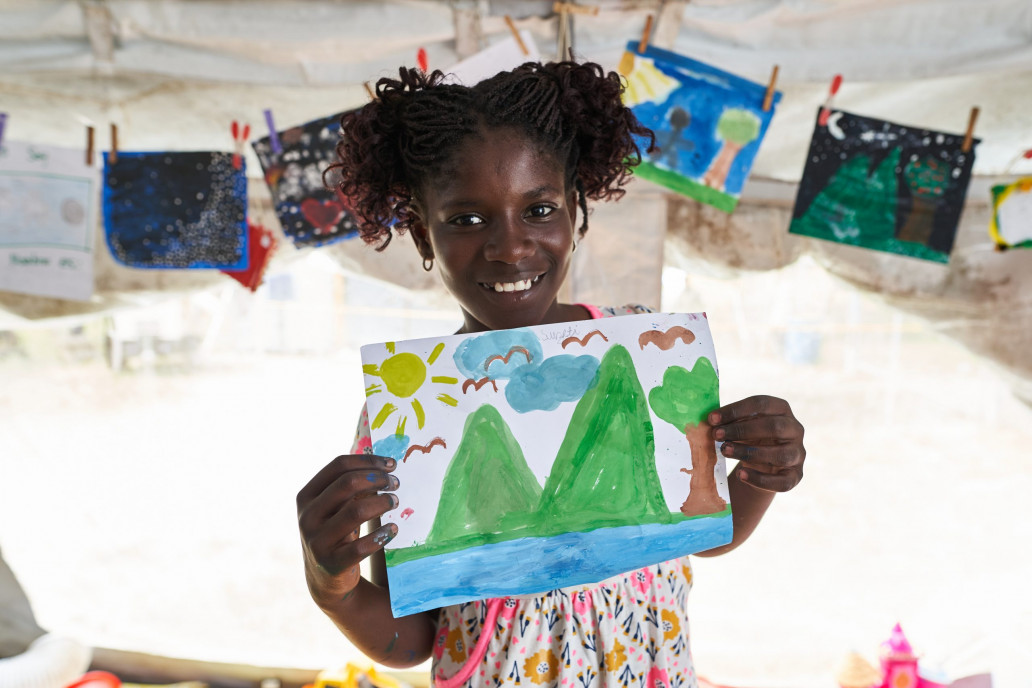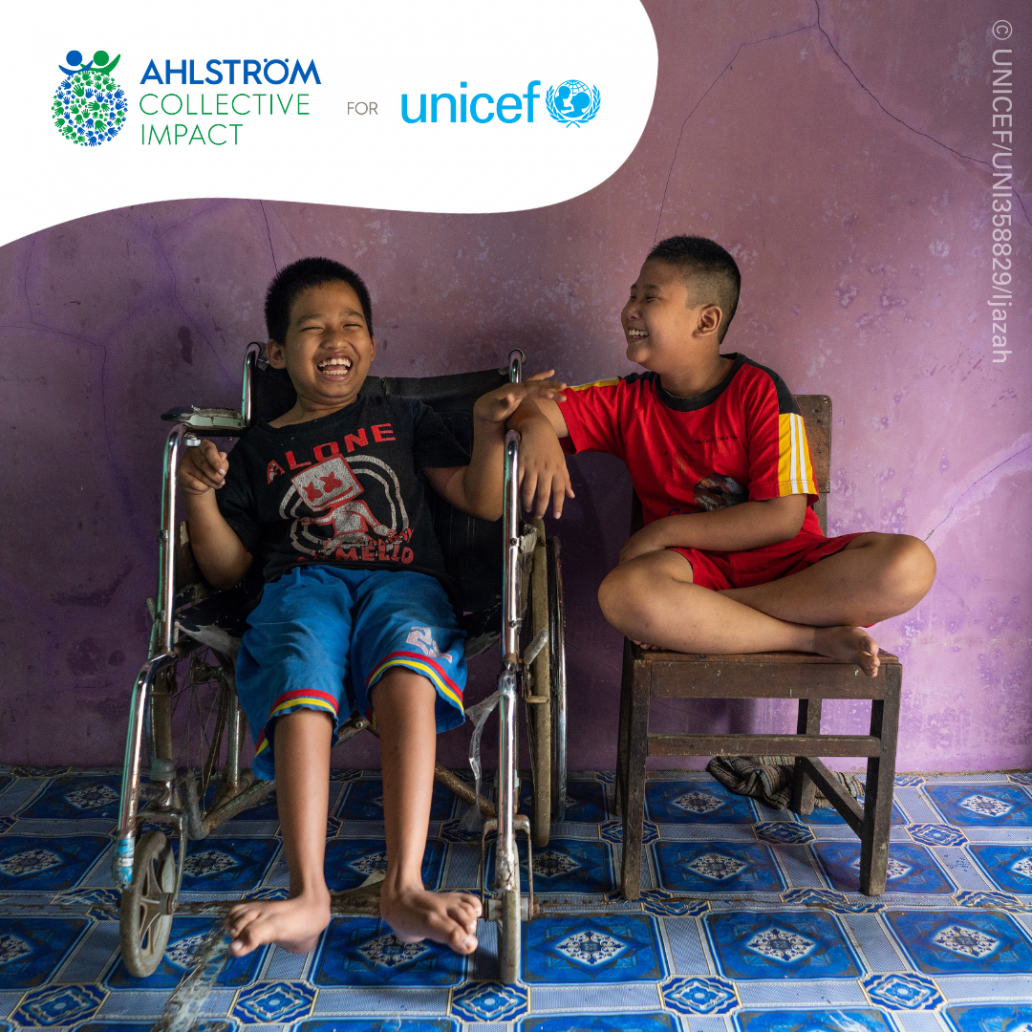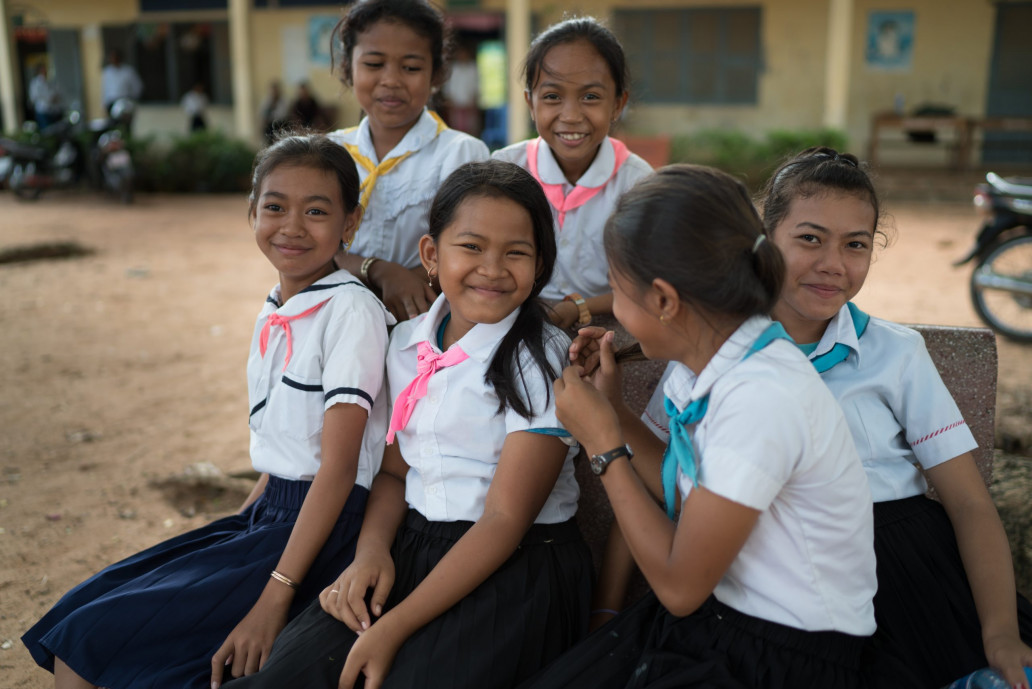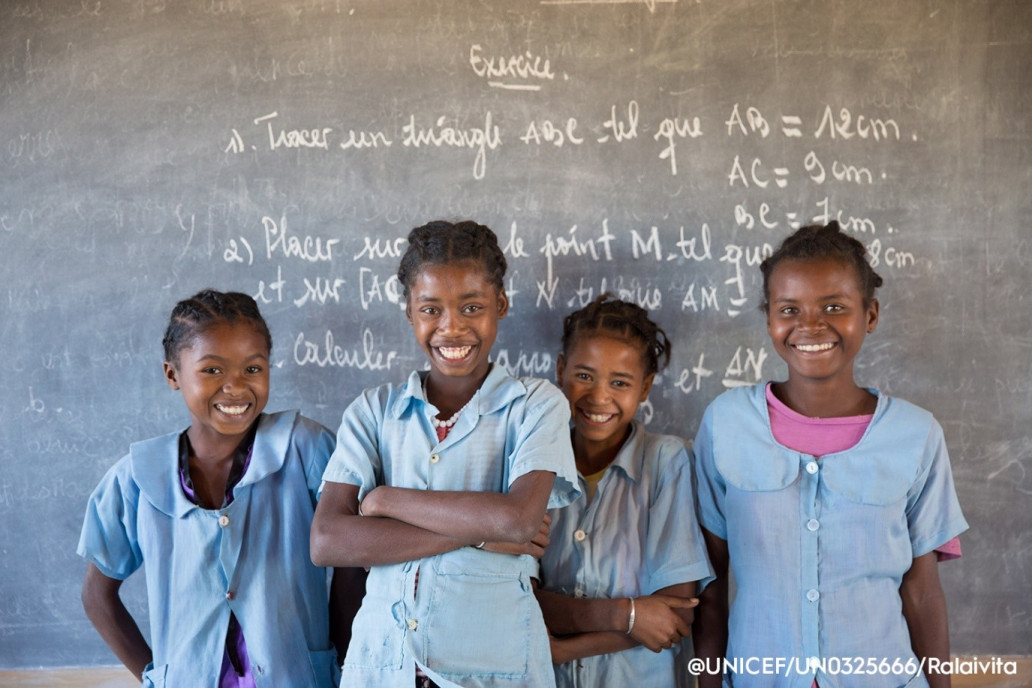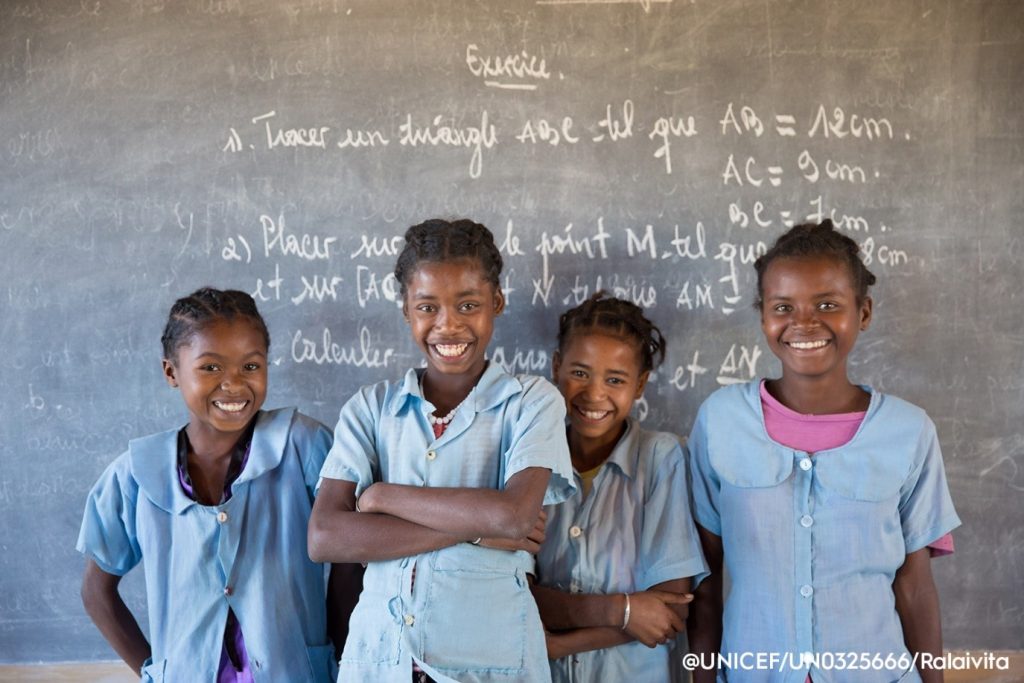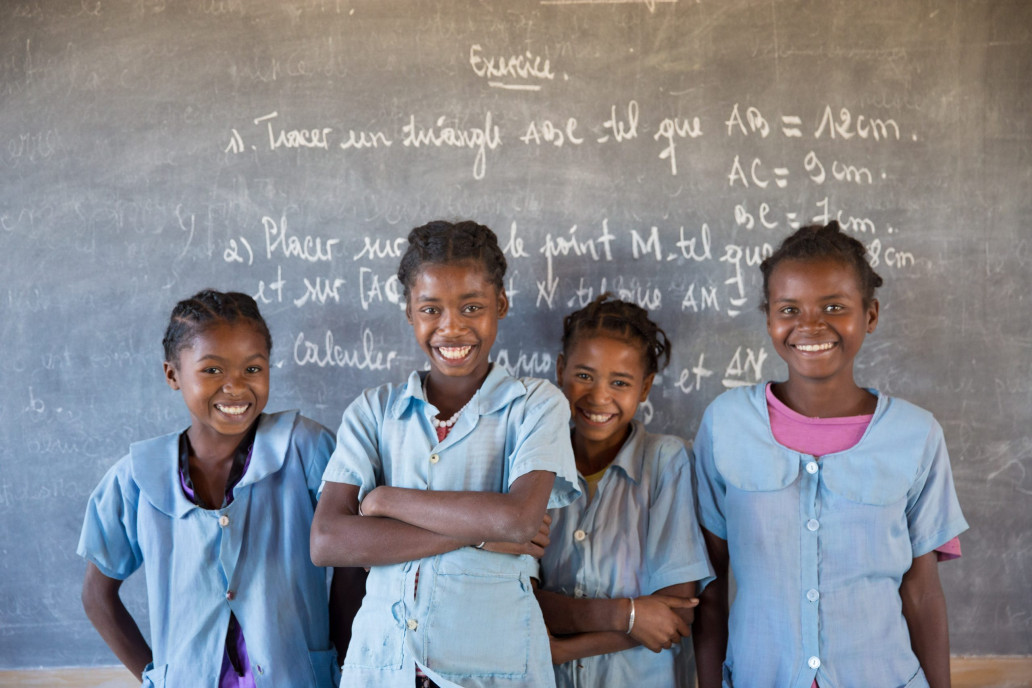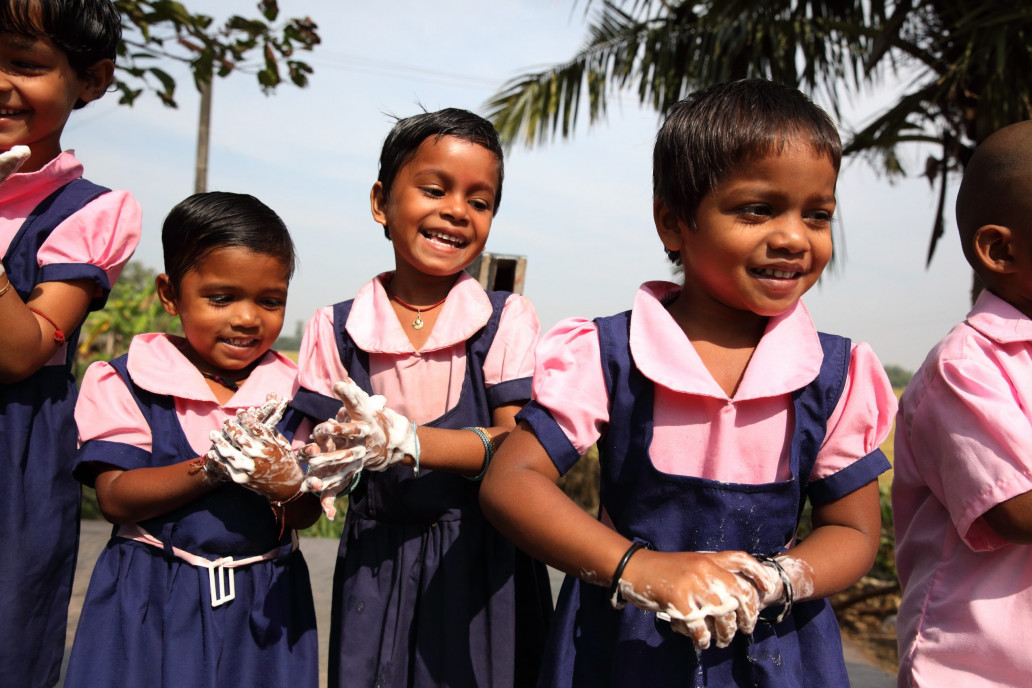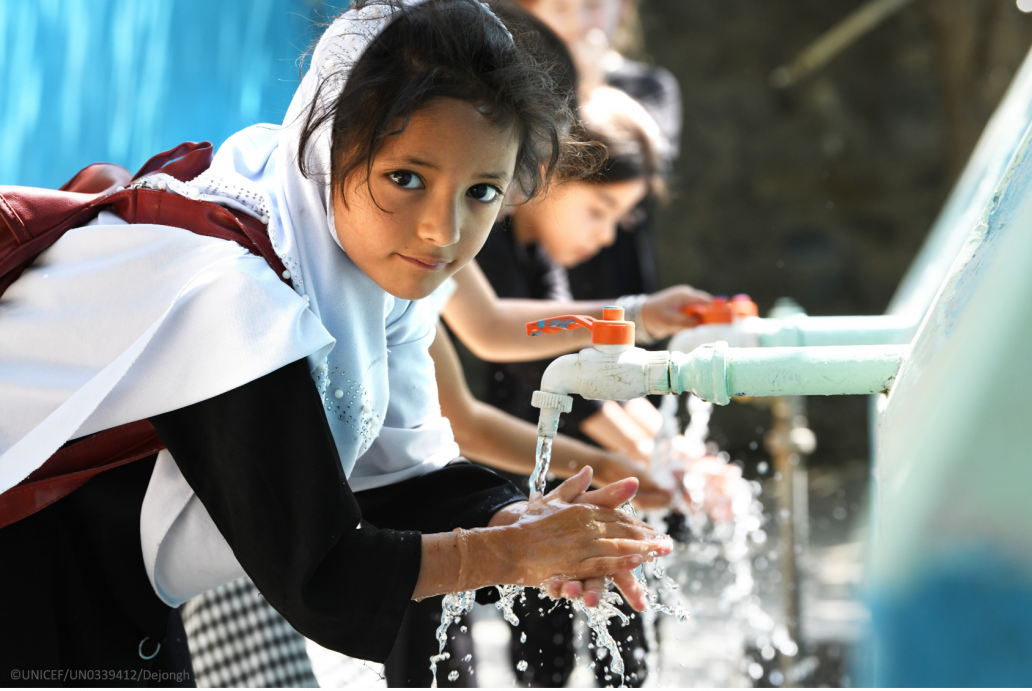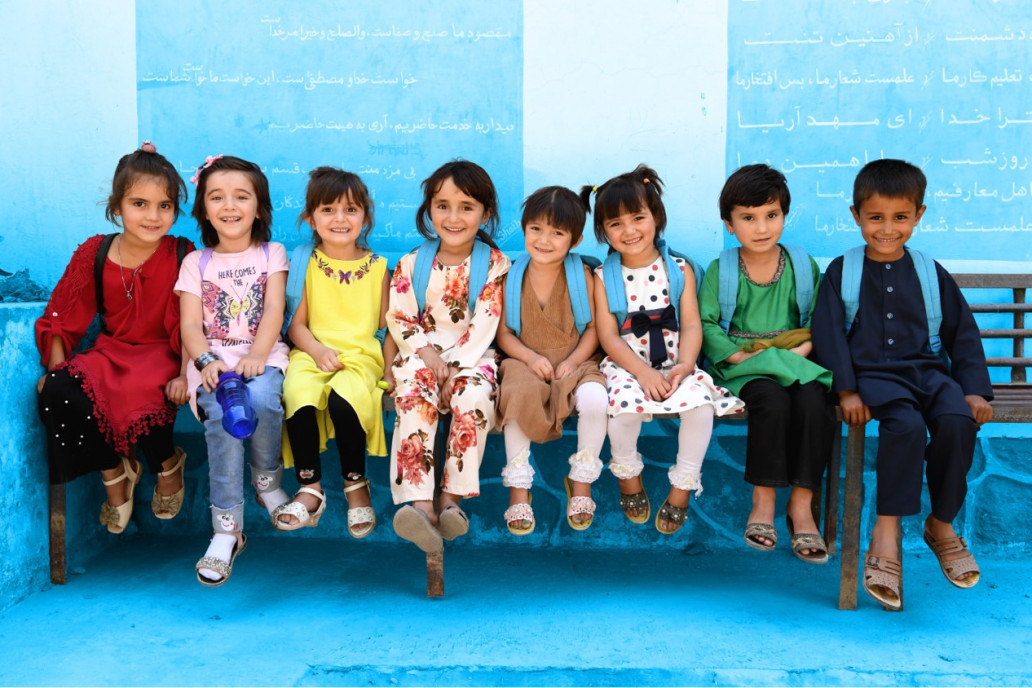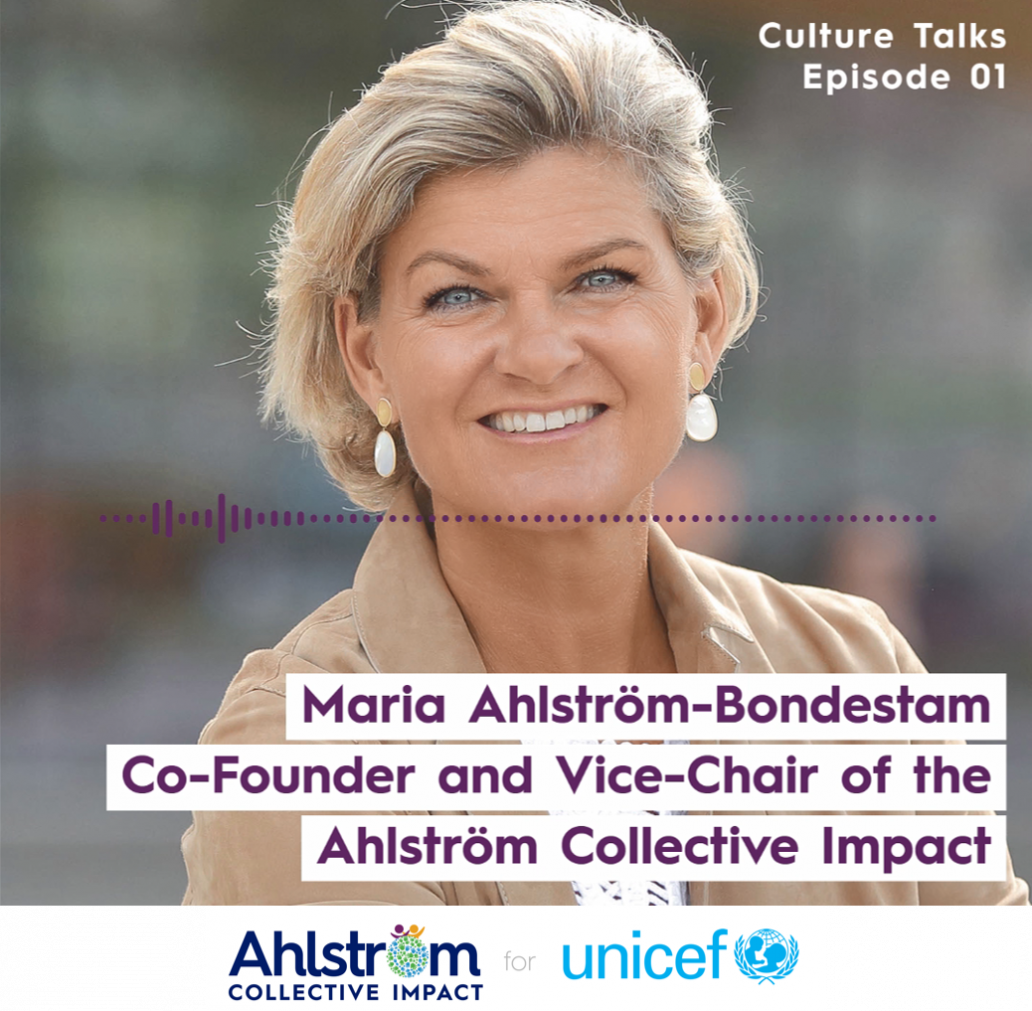Ahlström Collective Impact invests EUR 1 million in the welfare of children via UNICEF Finland

Investment used for education of children globally and to support children in Ukraine
Ahlström Collective Impact, a unique cooperation model bringing together the companies and foundations in the Ahlström network, has invested EUR 1 million in the education of children globally and to support children in Ukraine. Ahlström Collective Impact made an investment of EUR 770,000 into UNICEF’s Global Education Program in 2022. In addition, the companies, employees, foundations, and shareholders within the Ahlström Collective Impact have raised nearly EUR 300,000 for the children in Ukraine.
Quality education, gender equality and partnerships for the goals
Ahlström Collective Impact unites 10 public and private companies, 3 foundations, shareholders and employees to act together with UNICEF Finland to support the realization of selected United Nations Sustainable Development Goals. This year, the joint investments will be directed to UNICEF’s Global Education Program, supporting goal number 4. UNICEF’s Global Education Program provides support for millions of children who need to continue to learn, grow and develop the skills necessary to thrive in life. By bringing together the companies and foundations in the Ahlström network, the initiative can have a bigger impact than the partners could have alone.
“Ahlström Collective Impact is very much a continuation of the values and beliefs held by my great-great-grandparents Antti and Eva Ahlström, who 170 years ago passionately argued that an investment in an equal education for girls and boys is the basis for a stable society, a prosperous business as well as the key to a sustainable future. We are now supporting these topics on a global level through cooperation with UNICEF ”, says Maria Ahlström-Bondestam, Chair of Ahlström Collective Impact.
"Education plays a key role in reducing inequality and poverty and strengthening societal stability. Right now, nearly two-thirds of ten-year-olds are unable to read and understand a simple text. UNICEF works for the education of every child, so that children would have the skills and abilities needed to thrive in the future. This work would not be possible without strong and innovative supporters like Ahlström Collective Impact", says Marja-Riitta Ketola, Executive Director, UNICEF Finland.
The entire Ahlström network comes together
The Ahlström Collective Impact includes the entire Ahlström network of companies and foundations; Antti Ahlström Perilliset, Ahlström Capital, Ahlström Invest, Ahlstrom-Munksjö, Destia, Detection Technology, Enics, Glaston, Suominen, Avain Yhtiöt, M&J Recycling, the Eva Ahlström Foundation and Walter Ahlström Foundation. Ahlström Collective Impact was initiated by the Eva Ahlström Foundation in 2020, with the purpose of inspiring a new type of collaboration within the Ahlström network.
Ahlström Collective Impact supporting UNICEF Global Education Program - Key Results 2021
The pandemic brought education systems across the world to a halt, with school closures affecting more than 1.6 billion learners at its peak, including 167 million younger children who lost access to early childhood education. Learning losses are substantial, with the most marginalized children and youth disproportionately affected.In 2021, the COVID-19 pandemic continued to disrupt education for millions of children. Education plays a key role in reducing inequality, cutting poverty rates, and strengthening societal stability. It contributes to a better society and sustainable development. Without skills for lifelong learning and active citizenship, children face greater barriers to earning potential and employment later in life.
UNICEF works around the world to support quality learning for every child. UNICEF’s aim is to ensure that every child and adolescent has access to school and quality learning.
In 2021 Ahlström Collective Impact supported UNICEF’s Global Education Program and could therefore help to offer thousands of children around the world:
- An equitable access to quality education.
- Improved learning outcomes.
- Skills development for knowledge and skills to face an ever-changing world.
This report summarizes some of the key results of how UNICEF together with its partners, worked for children’s education in 2021
Ahlström Collective Impact supports children's education
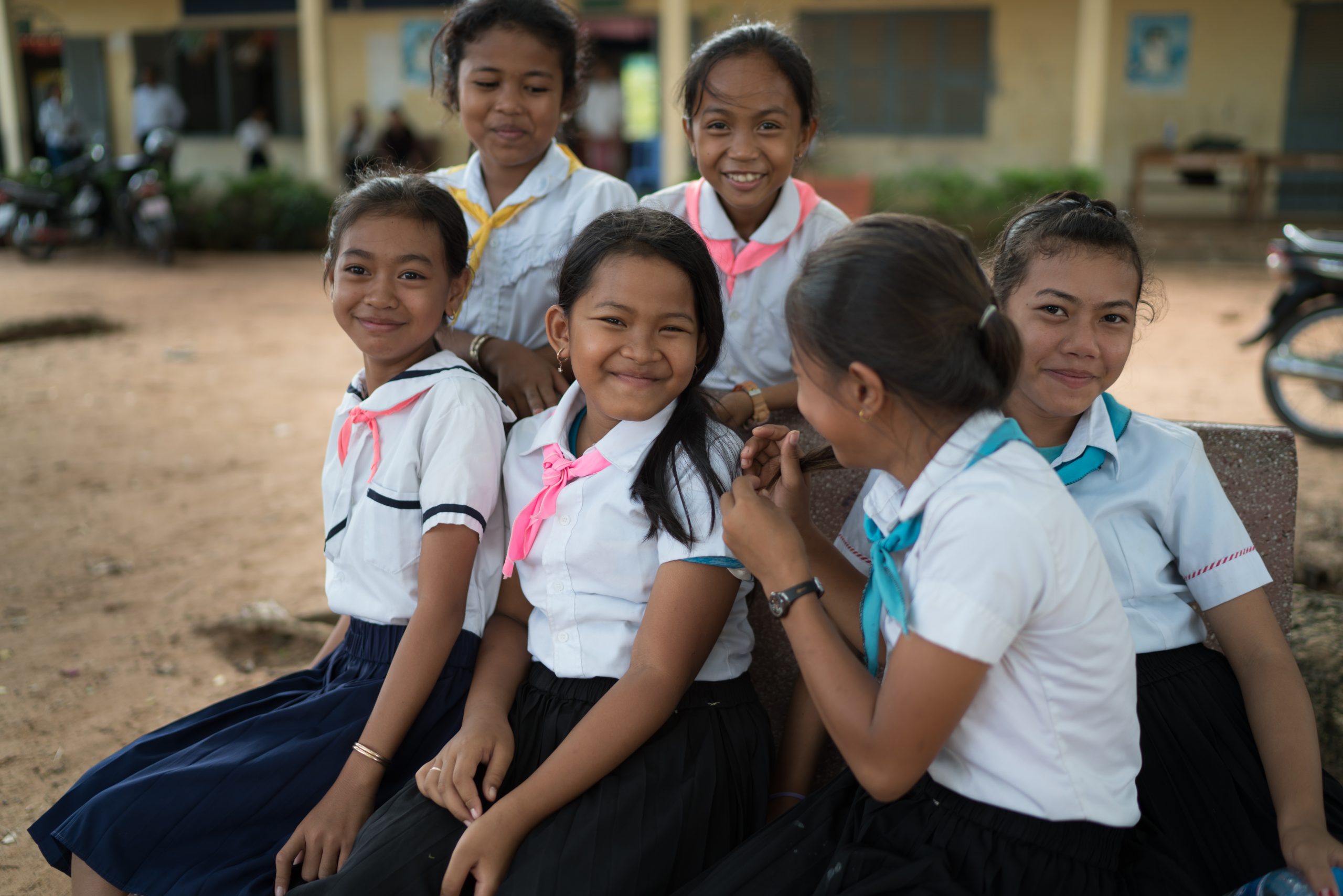
We, as part of Ahlström Collective Impact support every child’s right for quality education with Ahlström Collective Impact's support, UNICEF can: improve the quality of education, prevent student drop-out, promote equity and inclusion, offer alternative learning opportunities for those out of school, with an emphasis on girls, promote digital learning and active citizenship and employment. Read more about the importance of education here below or here
All children have the right to go to school and learn. UNICEF is committed to ensuring that every child gets access to quality education.
SUPPORTING EDUCATION
- Education plays a key role in reducing inequality, cutting poverty rates, and strengthening societal stability
- Education contributes to a better society and sustainable development
- Without skills for a lifelong learning and active citizenship, children face greater barriers for earning potential and employment in later life
EVERY CHILD HAS THE RIGHT TO LEARN
UNICEF works around the world to support quality learning for every girl and boy. Our aim is to ensure that every child and adolescent has access to school and quality learning.
EDUCATION IS A POWERFUL INVESTMENT
- For each additional year of studies, the GDP per capita could increase by 20%.
- Each additional year of schooling could boost personal income by 10%. For girls, as much as 20%.
GOOD NEWS
Globally, education for children has taken huge steps forward during the last 50 years. As many as 90% of children around the world start school every year.
HOWEVER, THERE ARE CHALLENGES
- Schooling does not always lead to Many students fail to learn even the basic skills at school.
- The situation is the weakest for children living in Sub-Saharan Africa.
- The challenges of learning are strongly linked to e.g. poverty, long distances between home and school, low appreciation of education, gender inequality, and child marriage
- A worrying number of children – especially girls – drop out of The longer children stay out of school, the less likely they are to return.
AN ESTIMATED 1.6 BILLION LEARNERS HAVE BEEN AFFECTED BY SCHOOL CLOSURES DUE TO THE PANDEMIC
- In 2020, one out of 3 schoolchildren did not have access to any form of distance learning
- These disruptions further highlighted inequalities between children. The most vulnerable were at a particular risk of falling behind. In low- and middle- income countries, learning losses due to school closures have left up to 70% of 10-year-olds unable to read or understand a simple text, up from 53% pre-pandemic.
- Child marriages are estimated to grow by 10 million by 2030. As many as 9 million children risk facing child labour by the end of 2022
WITH YOUR SUPPORT, WE CAN
- Improve the quality of education and learning results by training teachers and producing learning materials
- Collaborate with families and communities to help them support children’s learning and prevent student dropout
- Continue our ongoing advocacy work, urging governments to prioritize and invest more in children's education
- Promote equity and inclusion, with focus on the most marginalized children, including children with special needs
- Support science and technology learning and digital skills for girls
- Promote digital and remote learning and connect every school in the world to the internet
- Offer alternative learning opportunities for those out of school, with an emphasis on girls
- Enhance the quality of early education and improve access to pre-primary education
- Promote active citizenship, employment and internship opportunities for young people
- Collaborate with partners to develop educational systems with innovative solutions that help boost the learning for every child
Through Ahlström Collective Impact we want to give everyone in the Ahlström Network a chance to contribute towards the realization of the The Sustainable Development Goals
Maria Ahlström-Bondestam, Co-founder and Chair of the Board at the Eva Ahlström Foundation presenting at the Ahlström Network Day 2022.
The Sustainable Development Goals (SDG's) might sound intangible and uncomprehending – but in order for us to reach the goal of a sustainable world by 2030, we need to figure out ways to make these global goals local and find opportunities for everyone to contribute. Ahlström Collective Impact is our vehicle that makes it possible for everyone in the Ahlström Network, together with UNICEF Finland, to contribute towards the realization of the SDG’s. The uniqueness of Ahlström Collective Impact lies in the power, to bringing all entities together under one umbrella, and from letting purpose and values be the guiding principles that unites the Ahlström Network. Our common values have united us in helping to reach the SDG goals 4. Quality Education and 5. Gender Equality. Through our partnership with UNICEF, the UN organization for child rights
Ahlström Collective Impact celebrates World Children's Day together with UNICEF Finland
United Nations' World Children's Day is celebrated on November 20 each year to promote children's rights and welfare. Ahlström Collective Impact joins forces with UNICEF Finland to raise awareness about the wellbeing of the new generations as part of the World Children's Day celebrations.
This year Ahlström Collective Impact wants to draw attention especially to quality education. The Convention on the Rights of the Child states that every child has the right to an education. To remind everyone about this right and children's rights in general, the members of Ahlström Collective Impact spread the message about World Children's Day among their employees and external stakeholders. This includes different internal and external communication campaigns and activities taking place during November 15-20.
Read more about World Children's Day: https://www.un.org/en/observances/world-childrens-day
Read more about Ahlström Collective Impacts investment into UNICEF's Global Education Program here.
Ahlström Collective Impact makes a significant investment into UNICEF’s Global Education Program
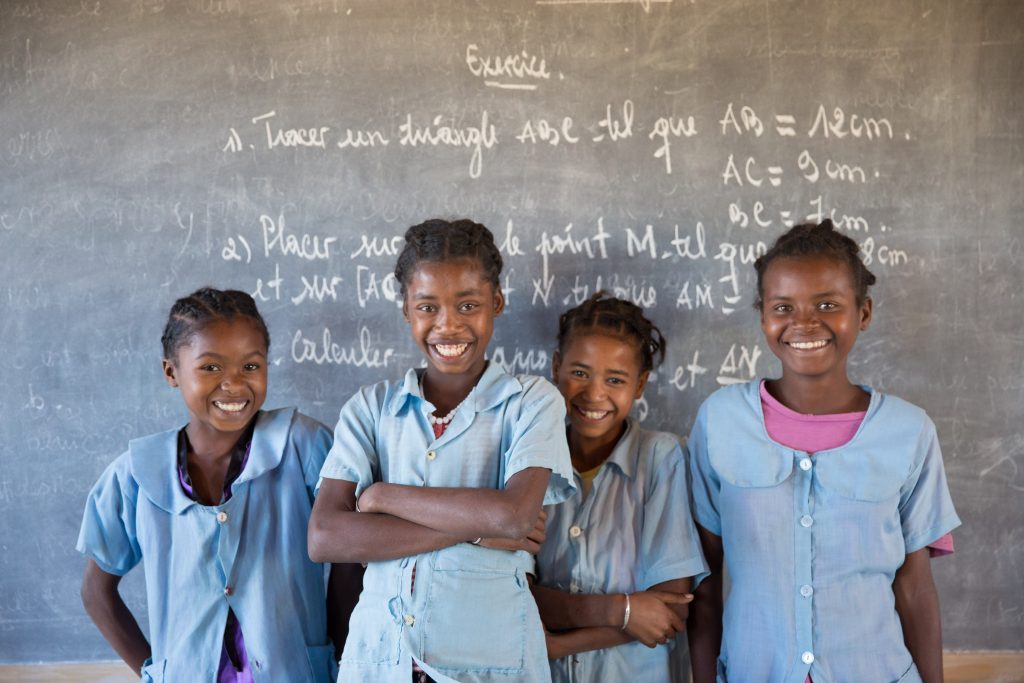
Ahlström Collective Impact is a joint responsibility initiative by the Ahlström Network companies and foundations. As of June 2021, this unique collaboration forum has been further strengthened as Suominen and Enics along with the Walter Ahlström Foundation have joined Ahlström Collective Impact. For 2021, Ahlström Collective Impact has succeeded in more than doubling the investment it makes and donates 600,000 euros into UNICEF’s Global Education Program.
Initiated by the Eva Ahlström Foundation in 2020, Ahlström Collective Impact is a unique co-operation model that joins together the Ahlström Network companies and foundations. Ahlström Collective Impact consists of Ahlström Capital, Ahlstrom-Munksjö, Destia, Enics, Glaston, Suominen, Antti Ahlström Perilliset, Eva Ahlström Foundation and Walter Ahlström Foundation and it acts in partnership with UNICEF Finland.
Ahlström Collective Impact is designed for targeted strategic investments that support the realization of selected United Nations’ Sustainable Development Goals (SDGs). In order to support the goal for quality education (SDG number 4), Ahlström Collective Impact has decided to direct its investment of 600,000 euros to UNICEF’s Global Education Program.
In 2020, Ahlström Collective Impact focused on supporting the COVID-19 crisis aid to children. In 2021, Ahlström Collective Impact will focus on the learning crisis caused by the COVID-19 pandemic.
To address the learning crisis, UNICEF strives to ensure every student gains a solid foundation in basic reading and mathematics – skills that are the foundation for all learning throughout childhood and beyond. Focusing on the most marginalized children in low- and middle-income countries, is critical for meaningful progress on all targets under SDG number 4.
“The private sector has a huge role in the realization of the SDGs and for finding new ways to collaborate. To further demonstrate our belief that prosperous businesses and stable societies are interdependent, shareholders from the Ahlström Family decided to match the companies’ investment for the year 2021”, comments Maria Ahlström-Bondestam, Co-founder and Chair of the Board at the Eva Ahlström Foundation.
Summary of Ahlström Collective Impact's and UNICEF's 2020 COVID-19 response published
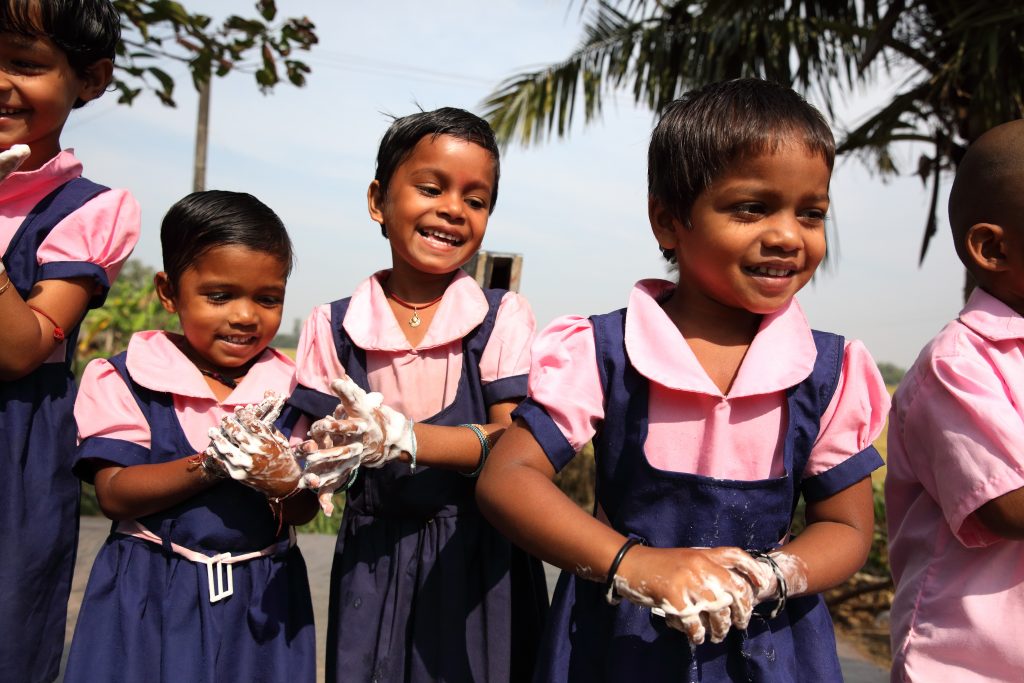
These young girls are practicing safe handwashing in Odisha, India as part of UNICEF’s work against COVID-19. Last year Ahlström Collective Impact focused on supporting children’s wellbeing and health during the COVID-19 pandemic. With the investment of 240 000 euro, UNICEF could, for example,
- provide 50 healthcare facilities with supplies of water and sanitation equipment in Nepal, and
- provide 125 000 school children with access to remote learning programs when schools were disrupted in Guinea-Bissau, and
- reach 1 million people with urgent health and hygiene messaging through social media in Costa Rica.
Disruptions to society caused by the pandemic have had a heavy impact on children: on their safety, their well-being, and their future. As these services were compromised, UNICEF took action to prevent this health crisis turning into a child rights crisis.
Read the summary here.
The family matriarch paved the way: Ahlström Collective Impact wants to spark change
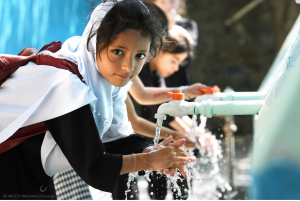
The goals set by Ahlström Collective Impact are high: through investments, the initiative aims to guarantee a better world for children. Ahlström Collective Impact is a unique initiative created to address the challenges sustainable development faces. The initiative is founded by Ahlström Network companies and foundations in strategic partnership with UNICEF.
Eva Ahlström, the matriarch who led the Ahlström family business at the turn of the 20th century, was known for her social responsibility. With her help, a shelter for the elderly and the Eva Ahlström Hospital were built in Noormarkku in Western Finland. The Ahlström family also supported, among other things, the construction of schools in the area.
Johannes Gullichsen, Chairman of the Board, Antti Ahlström Perilliset Oy, says: “For 170 years the Ahlström Family has acted according to the values of the founders of the Ahlström companies. Social and ecological responsibility as well as economic sustainability are high on our agenda. The Eva Ahlström Foundation has with its exemplary actions reconnected us with our values and proven to be an innovative force.”
Therefore, it is no surprise that the Ahlström Collective Impact, a collaborative project founded in August last year, was initiated by the Eva Ahlström Foundation. What makes the project special is that a group of companies come together to solve the challenges of sustainable development. The ambition is also high. The purpose is to make a strong impact through investments and create permanently better conditions for children.
“UNICEF is proven to make a difference”
UNICEF, with whom the Eva Ahlström Foundation has successfully collaborated for the past decade, was chosen as a strategic partner for the initiative that Antti Ahlström Perilliset and the Ahlström Network companies Ahlström Capital, Ahlstrom-Munksjö, Destia and Glaston have also joined.
“UNICEF works systematically for children's rights. The organization is reliable and is proven to make a difference,” says Tarja Takko, Executive Vice President, People and Safety at Ahlstrom-Munksjö. “Through strategic Corporate Social Responsibility, we are able to pursue both sustainable development and our business goals.”
Investments in responsibility also benefit business
Ahlström Capital's CEO Lasse Heinonen is pleased that so many companies have committed to the initiative.
“Ahlström Collective Impact is a project that benefits everyone. An investment in children is an investment in the future. We can achieve significant results when working together with different companies. Studies show that Corporate Social Responsibility also benefits businesses. I believe that the initiative will strengthen cooperation between the companies in the Ahlström Network.”
First investment contributed to the battle against COVID-19
The motivation of the members in the network is clear, as the first investment of €240,000 was made as soon as the initiative began.
“The negative impact of the COVID-19 pandemic on children is so significant that we unanimously decided to invest in the battle against it,” Tarja Takko says.
The donation came in handy. The pandemic has increased poverty, made access to food more difficult, reduced health services, and disrupted the education of tens of millions of children.
“Ahlström Collective Impact enables us to support children in accessing primary health care, education and safety in difficult circumstances,” says Nina Vähäpassi, Corporate Alliances Manager for UNICEF in Finland. She says that Ahlström Collective Impact, like other partners, receives regular updates on the impact of investments.
Businesses needed in solving the challenges of sustainable development
The balance of power has changed radically in the world and the influence of companies' economic value has increased. Achieving the UN’s Sustainable Development Goals also requires investments by companies. To promote children’s rights the solutions, skills, and perspectives that companies have are needed, says Nina Vähäpassi.
“Children's rights affect everyone. Companies need sustainable societies to ensure good operating environments.”
The initiative has evoked extremely positive reactions among company employees.
“I hope that our staff will be proud of what we have achieved through Ahlström Collective Impact,” says Lasse Heinonen of Ahlström Capital.
Nina Vähäpassi continues:
“Ahlström Collective Impact is a real pioneer. I would like to believe that this will inspire others as well. The world needs the hope that innovations like this create.”
Read more about the UN’s Sustainable Development Goals at: https://sdgs.un.org/goals
Ahlström Collective Impact for World Children's Day 2020
Welcome to celebrate World Children’s Day with Ahlström Collective Impact!
This week, we celebrate World Children's Week and on November 20th the week's grand finale is the World Children's day! You have a unique opportunity to learn about child rights and why they matter.
Please take this inspiring possibility to learn why Ahlström Collective Impact (ACI) has decided to partner with UNICEF and how we in the Ahlström Network can make a difference - together!
Sit back, learn and maybe share your insights with your colleagues and the children dearest to you.
On behalf of Ahlström Collective Impact -Thank you for watching.
Sustainability with the Ahlström Collective Impact and UNICEF Finland
In Ahlström-Munksjö's podcast Maria Ahlström-Bondestam of the Eva Ahlström Foundation and Nina Vähäpassi from UNICEF Finland discuss the Ahlström Collective Impact (ACI) – a new initiative committed to creating change by investing in a better future for children. The podcast is the first of 5 series on sustainability by Ahlstrom-Munksjö.
Listen here

